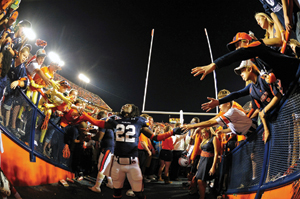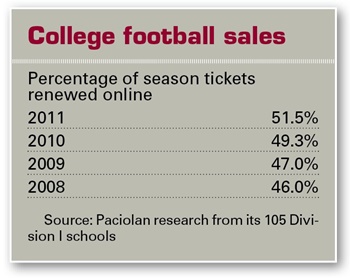For the first time, the majority of college football season tickets at Paciolan’s 105 Division I universities were renewed online this year.
Online transactions and digital delivery of tickets began roughly in the early to mid-2000s as universities moved toward a paperless approach to tickets. But it’s been in the last five years that the trend has picked up most of its momentum.
 |
GETTY IMAGES
Fans grabbed the chance to renew online when Auburn moved away from paper applications. |
It was prior to the 2009 season that Auburn University began marketing its season-ticket renewals through email and its official athletic website, rather than mailing out more than 10,000 paper applications. Right away, the Tigers saw almost all of their season-ticket holders renew online, where fans could access their donor information, complete a transaction using a credit card or e-check, then receive an email confirmation.
“People really liked being in control of their order,” said Stephen Naughton, Auburn’s assistant athletic director for ticketing. “We didn’t have credit card numbers floating through the mail or going through fax machines, so it felt more secure. And within a matter of minutes they received an email confirmation. They didn’t have to wait for everything to be processed and get a confirmation in the mail a month later.”
Paciolan research shows that 51.5 percent of all season tickets at its 105 Division I schools were renewed online. Of those 105 schools, 70 are in the Football Bowl Subdivision, formerly I-A.
Those numbers have been between 46 percent and 49 percent in the three previous years.
Auburn has led the way with 98 percent to 99 percent renewal online since it began the paperless process in 2009. Texas, a school that began offering online ticketing in 2002, saw 71 percent of its renewals executed online this year.
“We haven’t really seen any resistance to it at all,” said Craig Ricks, Paciolan’s vice president of marketing. “The online experience is so good now that people seem very comfortable with it.”
The process is fairly simple. Fans receive an email that contains a link to the online renewal site. They enter their password, or create one, and find out what seats are available to them, based on how much money they donate to the program. Some schools include information on the fan’s donor points, which are awarded based on money donated and longevity of membership. Many schools use donor points to prioritize seating for season tickets.
Once the renewal is made, tickets are typically delivered in an email that allows fans to print at home. The bar code on the ticket also enables fans to resell their tickets more easily. At Texas, fans also save anywhere from $10 to $20 on a processing fee if they renew online.
Schools save a modest amount, somewhere in the low five figures, on paper and stamps, while also saving manpower that used to go into the job of processing the orders.
Donations are similarly being made online. Texas generated more than $12 million in gifts last year through its online tool called DonorNet, accounting for 55 percent of annual giving to Longhorn athletics.
“It’s just a much more efficient process, whether it’s for season-ticket renewals or other occasions, like bowl games or NCAA tournament games,” said Mark Harrison, Texas’ assistant AD for ticket operations. “It also enables our staff to truly work on customer-service issues instead of just taking orders.”
The move to online renewals hasn’t completely been without hiccups. Last spring, when Auburn was sending out renewal notifications via email, not all of last year’s season-ticket holders were notified. When fans were slow to renew online, on the heels of the Tigers’ national championship season, Auburn officials figured out that a glitch prevented all of the email notifications from going out.
“We took a few lumps, but really, the process is down to about eight steps now, so it’s pretty simple,” Naughton said.
For the small percentage of people who don’t have computers, they still renew over the phone.
“Schools have more time to spend with the people who really need it,” Ricks said.





